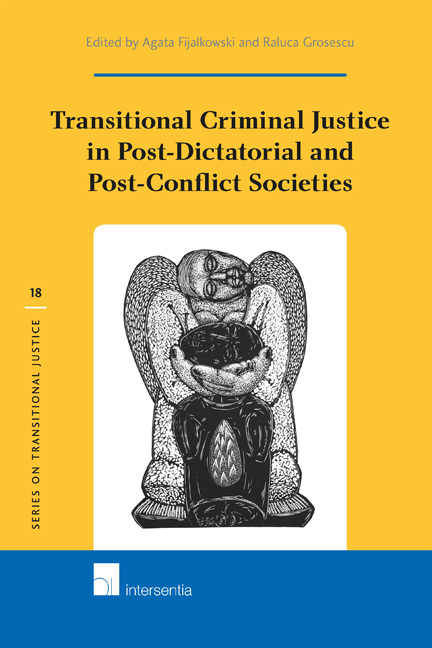Book contents
- Frontmatter
- Contents
- Introduction
- PART I CRIMINAL JUSTICE AS A METHOD OF DEALING WITH THE PAST: OPPORTUNITIES, STRATEGIES, AND LEGAL AND POLITICAL CONSTRAINTS
- Chapter 1 Retrospective Justice: Post-Communist Germany and Poland in Comparative Perspective
- Chapter 2 Transitional Justice in Nepal: Prosecutions, Reform and Accountability Strategies
- Chapter 3 Transitional Trials as History Writing: The Case of the Romanian December 1989 Events
- Chapter 4 Transitional Criminal Justice: The Polish Way
- Chapter 5 Public Contestation and Politics of Transitional Justice: Poland and Albania Compared
- Chapter 6 Consolidating Democracy Through Transitional Justice in Slovenia: Lessons Learnt?
- PART II UNIVERSAL PRINCIPLES V LOCAL PECULIARITIES: THE RELATIONSHIP BETWEEN NATIONAL JURISDICTIONS AND INTERNATIONAL LAW
- About the Authors
Chapter 6 - Consolidating Democracy Through Transitional Justice in Slovenia: Lessons Learnt?
from PART I - CRIMINAL JUSTICE AS A METHOD OF DEALING WITH THE PAST: OPPORTUNITIES, STRATEGIES, AND LEGAL AND POLITICAL CONSTRAINTS
Published online by Cambridge University Press: 28 November 2017
- Frontmatter
- Contents
- Introduction
- PART I CRIMINAL JUSTICE AS A METHOD OF DEALING WITH THE PAST: OPPORTUNITIES, STRATEGIES, AND LEGAL AND POLITICAL CONSTRAINTS
- Chapter 1 Retrospective Justice: Post-Communist Germany and Poland in Comparative Perspective
- Chapter 2 Transitional Justice in Nepal: Prosecutions, Reform and Accountability Strategies
- Chapter 3 Transitional Trials as History Writing: The Case of the Romanian December 1989 Events
- Chapter 4 Transitional Criminal Justice: The Polish Way
- Chapter 5 Public Contestation and Politics of Transitional Justice: Poland and Albania Compared
- Chapter 6 Consolidating Democracy Through Transitional Justice in Slovenia: Lessons Learnt?
- PART II UNIVERSAL PRINCIPLES V LOCAL PECULIARITIES: THE RELATIONSHIP BETWEEN NATIONAL JURISDICTIONS AND INTERNATIONAL LAW
- About the Authors
Summary
As many as 130,000 people are estimated to have been summarily executed in Slovenia in the months following the end of WWII on 8 May 1945. This chapter first outlines the factual background of the crimes committed in the Slovenian territory after WWII. It then goes on to discuss the decisions of the Slovenian District and High Courts in the case against former officials of the dictatorial regime. The chapter thereafter analyses the decisions from the perspective of international criminal law and transitional justice, in an attempt to draw out lessons concerning the understanding of current ideological divisions in Slovenia. Equipped with this knowledge, the chapter argues that there exist strong legal and moral grounds for prosecuting crimes against humanity committed in Slovenia after WWII. Though the present situation may appear grim, consensus appears to be growing for meaningful and continued reform, which would settle the question of post-war killings and the secret mass graves of victims, in a manner that will respect victims’ right to a name and a grave, and enhance the current state of democracy in Slovenia.
INTRODUCTION
As many as 130,000 people are estimated to have been summarily executed in Slovenia in the months following the end of WWII on 8 May 1945. It is further estimated that around 15,000 of those executed were of Slovenian nationality, while others included Croats, Serbs and Germans. The victims were mostly civilians but also members of the Slovenian Home Guards and other political opponents of the resistance movement led by the Slovenian Communist Party (SCP). These crimes, carried out by members of the Slovenian section of the Yugoslav Secret Police, were committed mostly in the form of systematic summary executions at hidden locations across Slovenia, predominantly in unpopulated rural areas and in forests. They were part of a systematic plan of the SCP to eliminate their political opponents and their families, civilian or otherwise. It is still unclear whether the orders originated from the head of the former Yugoslav Security Police in Belgrade or the Slovenian branch in Ljubljana. The Commission for the Settlement of Hidden Mass Gravesites of the Government of the Republic of Slovenia (CSHMGGRS) has indicated that so far almost 600 hidden mass graves have been found in Slovenia far. Its long-term goal is the exhumation and reburial of all victims killed on Slovenian territory.
- Type
- Chapter
- Information
- Publisher: IntersentiaPrint publication year: 2015



